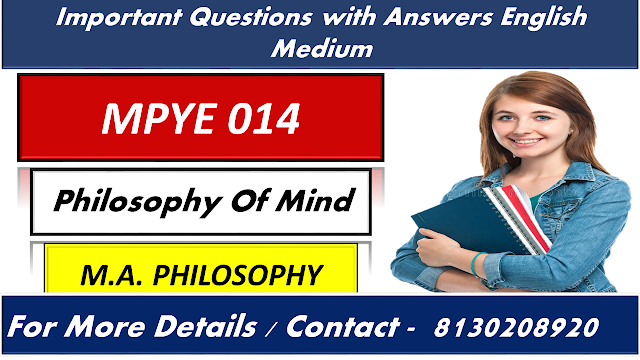IGNOU MPYE 014 Important Questions With Answers English Medium
MPYE 014, "Philosophy of Mind," sounds like a
fascinating course This branch of philosophy grapples with fundamental
questions about our consciousness, mental states, and the relationship between
the mind and the brain.
Course
Structure:
- Block 1: Introduction to Philosophy of Mind: Introduces key concepts and theories, historical background, and different approaches to studying the mind.
- Block 2: Consciousness and its Problems: Examines the nature of consciousness, the hard problem of consciousness, and different theories of consciousness.
- Block 3: Mind and Body: Explores the relationship between the mind and the brain, including arguments for and against materialism and dualism.
- Block 4: Special Topics: Delves into specific areas of interest within philosophy of mind, such as free will, personal identity, artificial consciousness, and animal minds.
Q.1
What is the mind - body problem ? Discuss various theories proposed to resolve
them.
The mind-body problem is a philosophical and metaphysical
inquiry that revolves around the relationship between the mind and the body, or
more broadly, between consciousness and the physical world. This intricate
puzzle has perplexed philosophers, scientists, and scholars for centuries,
giving rise to a myriad of theories attempting to reconcile the apparent
duality of mental and physical phenomena.
IGNOU MPYE 014 Important Questions With Answers English Medium-One classical perspective on the mind-body problem is
dualism, famously expounded by René Descartes in the 17th century. Cartesian
dualism posits that the mind and body are distinct substances with
fundamentally different natures. According to Descartes, the mind is a
non-material, thinking substance, while the body is a material, extended
substance. The challenge with dualism lies in explaining how these two distinct
substances interact, as the mind seems to influence the body and vice versa.
Descartes proposed that the pineal gland served as the point of interaction,
but this theory faced criticism for lacking empirical support.
Subsequent to dualism, materialism emerged as a contrasting
theory. Materialism asserts that only physical entities and processes exist,
rejecting the idea of a non-material mind. Behaviorism, a subset of materialism
prominent in the mid-20th century, posited that all mental states and processes
could be reduced to observable behavior and external stimuli. However,
behaviorism faced challenges in accounting for subjective experiences and the
richness of consciousness, leading to its eventual decline.
IGNOU MPYE 014 Important Questions With Answers English Medium-Identity theory, a more modern form of materialism, suggests
that mental states are identical to brain states. This theory maintains that
mental phenomena can be fully explained by the physical processes occurring in
the brain, thus eliminating the need for a separate non-material mind. However,
identity theory struggles to address the subjective, qualitative aspects of
consciousness known as qualia, which seem to resist easy reduction to neural
activity.
Also Read-
- IGNOU MPYE 013 Important Questions With Answers English Medium
- IGNOU MPYE 012 Important Questions With Answers English Medium
- IGNOU MPYE 011 Important Questions With Answers English Medium
Functionalism represents another materialistic approach to
the mind-body problem. Unlike identity theory, functionalism emphasizes the
role and function of mental states rather than their specific physical
instantiation. This theory contends that mental states can be understood by
their functional role in an organism's cognitive processes, regardless of the
underlying physical substrate. Functionalism has gained traction in cognitive
science and artificial intelligence but faces challenges in providing a
complete account of subjective experience.
IGNOU MPYE 014 Important Questions With Answers English Medium-Emergentism, yet another perspective, posits that
consciousness emerges from complex physical processes in the brain. Advocates
of emergentism argue that mental properties are not reducible to, or
predictable from, the physical properties of individual neurons but emerge from
their interactions. This theory, while offering a bridge between materialism
and dualism, leaves some unanswered questions regarding the nature of emergence
and the fundamental properties of consciousness.
A more recent and influential theory is the mind-brain
identity theory, which asserts that mental states are identical to brain
states, offering a more refined version of materialism. According to this
theory, each type of mental state corresponds to a specific type of brain
state, providing a one-to-one relationship. However, challenges persist in
explaining how subjective experiences, such as pain or the taste of chocolate,
can be entirely equated with neural activity.
Eliminative materialism represents a more radical departure
from traditional theories. Advocates of this perspective propose discarding our
common-sense understanding of mental states altogether, contending that future
scientific advancements may render concepts like beliefs and desires obsolete.
While eliminative materialism challenges conventional notions of consciousness,
it is met with skepticism and resistance due to its revolutionary nature and
the perceived loss of our everyday mental vocabulary.
Q.2
Explain different concepts involved in the understanding of mind. Write with
regard to the constitution and functioning of mind.
Q.3
Explain the concept of dream in different philosophical and religious
traditions.
Q.4
Explain the relationship between language and consciousness among grammarians,
Mimamsa and Bhuddhism.
Q.5
Explain the concept of lived body ' found in the tradition of phenomenology.
Q.6
Explain the Vedantic and Samkhya theory of perception.
Q.7
Relate the salient contributions of Frend and Carl Jung in the context of
dreaming.
Q.8
Explain the relation between philosophy of mind and neuro biology.
Q.9
How would you define philosophy of mind ? Discuss its scope and significance in
detail
Q.10
How can mind interact with body ? Discuss in the light of western philosophical
perspective.
Q.11
Give a philosophical account of perception according to prominent Indian
Philosophical Schools.
Q.12
What are the significant themes discussed in the philosophy of mind ?
Q.13
Illustrate volition as adoptive decision- making.
Q.14
Explain the theory of essential word (Sphotavada).
Q.15
What is Wittgenstein’s account of understanding ? Discuss.







0 comments:
Note: Only a member of this blog may post a comment.